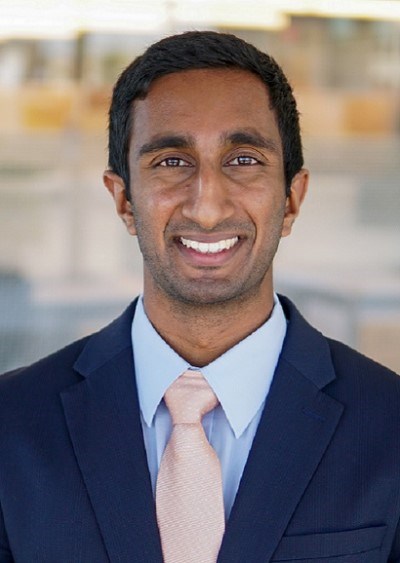Vishnu Muppala, MD, MPH | Health Policy Academy Fellow
Having a structured environment to learn, explore, and grow outside of medicine is invaluable. Particularly in the hurricane that is residency, it is especially important to be intentional about nurturing these interests. Because of this, I was elated to be accepted as a Health Policy Academy Fellow.
Entering the program, I felt that I was a relative novice with regards to organized medicine and the policy-making process. Building that knowledge was intimidating, but it was made manageable (and even fun?) by our fierce leaders and by being able to do it alongside my co-fellows. When I met them, I found my co-fellows to be bright, charismatic, and passionate. I really loved how we were all so different, and I think that made us a strong team over the last year.
The strength of the fellowship is by far being able to learn from and work alongside physicians who are, and will be, policy leaders in our field. In fact, my greatest growth from last year was almost undoubtedly outside of the formal curriculum. From being in the room with EMRA board members to idle chatting between my co-fellows, I picked up leadership skills and practical applications of them that will, without a doubt, benefit me in my personal and professional life.
I do not say that to diminish the tangible aspects of the formal curriculum; they were substantial. For instance, I previously had tangential interaction with the policy-making process, but many topics related to resolution writing and parliamentary procedure were inaccessible to me. This was for good reason. I learned that even seasoned veterans of parliamentary procedure found themselves lost, so without formal training, what chance did I have? My co-fellows and I trained on the basics, practiced in simulations, and then applied these skills as the Reference Committee for the EMRA Representative Council meeting at CORD. This learning curve became even steeper when we were tasked with being team leads for policy discussions on ACEP resolutions and alternate councilors for ACEP Council.
ACEP Council was my top highlight of the past year. The environment was exciting, inspiring, and chaotic. I had never seen so many doctors in one room. Even crazier is that all of them were policy-oriented emergency physicians. I was fascinated to learn about their ideological and practice diversity as we all discussed ACEP policy. At Council’s conclusion, seeing the formalized policy and being a part of its creation reinforced the deep respect I had picked up throughout the year for the importance and power of policy in arenas such as the one that I had just participated in.
Each of us in our careers as emergency providers will be directly affected by policy. My involvement with it will be determined in the future, but at the very least I now feel that I have a deeper understanding for its development and implementation. My interests are generally in community-based health interventions and how we can use the emergency department to promote health equity through improving access. The past year has equipped me with additional tools to be an effective advocate through a more comprehensive understanding of the language and pathways through which strong policy must be achieved.
Overall, I gained skills, experiences, friends, role models, and a great deal more as a Health Policy Academy Fellow. I found the program to be effective in its education and flexible to individual interests. For me, it has been a powerful steppingstone that will undoubtedly assist me with my goals as an aspiring emergency physician and health advocate.



